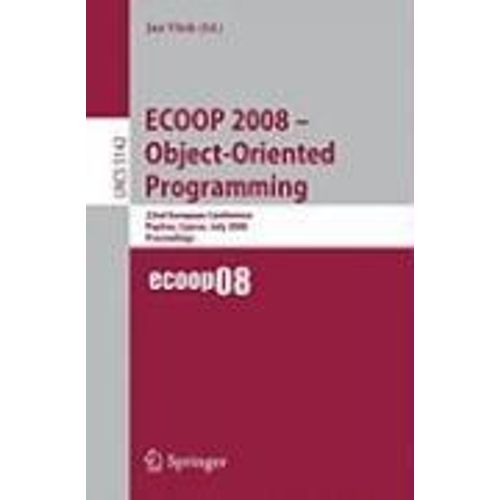

ECOOP 2008 - Object-Oriented Programming -
- Format: Broché
- 716 pages Voir le descriptif
Vous en avez un à vendre ?
Vendez-le-vôtre50,69 €
Produit Neuf
Ou 12,67 € /mois
- Livraison à 0,01 €
- Livré entre le 4 et le 7 août
- Payez directement sur Rakuten (CB, PayPal, 4xCB...)
- Récupérez le produit directement chez le vendeur
- Rakuten vous rembourse en cas de problème
Gratuit et sans engagement
Félicitations !
Nous sommes heureux de vous compter parmi nos membres du Club Rakuten !
TROUVER UN MAGASIN
Retour

Avis sur Ecoop 2008 - Object - Oriented Programming Format Broché - Livre Informatique
0 avis sur Ecoop 2008 - Object - Oriented Programming Format Broché - Livre Informatique
Donnez votre avis et cumulez 5
Les avis publiés font l'objet d'un contrôle automatisé de Rakuten.
Présentation Ecoop 2008 - Object - Oriented Programming Format Broché
- Livre InformatiqueEditeur : Springer BerlinLangue : AnglaisParution : 01/07/2008Format : Moyen, de 350g à 1kgNombre de pages : 716Expédition : 1066Dimensions : 23.5 x 15.5 x 3.9 Résumé :It...

Résumé :
It is a pleasure to present the proceedings of the 22nd European Conference on Object-Oriented Programming (ECOOP 2008) held in Paphos, Cyprus. The conference continues to serve a broad object-oriented community with a tech- cal program spanning theory and practice and a healthy mix of industrial and academic participants. This year a strong workshop and tutorial program c- plementedthemaintechnicaltrack.Wehad13workshopsand8tutorials,aswell as the co-located Dynamic Language Symposium (DLS). Finally, the program was rounded out with a keynote by Rachid Guerraoui and a banquet speech by James Noble. As in previous years, two Dahl-Nygaard awards were selected by AITO, and for the ?rst time, the ECOOP Program Committee gave a best paper award. Theproceedingsinclude27papersselectedfrom138submissions.Thepapers werereviewed in a single-blind process with three to ?ve reviews per paper. P- liminaryversionsofthereviewsweremadeavailabletotheauthorsaweekbefore the PC meeting to allow for short (500 words or less) author responses. The - sponses were discussed at the PC meeting and were instrumental in reaching decisions. The PC discussions followed Oscar Nierstrasz?Champion pattern. PC papers had ?ve reviews and were held at a higher standard.
Sommaire:
Keynote.- The Return of Transactions.- Session I.- A Model for Java with Wildcards.- On Validity of Program Transformations in the Java Memory Model.- Safe Cross-Language Inheritance.- Session II.- Liquid Metal: Object-Oriented Programming Across the Hardware/Software Boundary.- Kilim: Isolation-Typed Actors for Java.- A Uniform Transactional Execution Environment for Java.- Session III.- Ptolemy: A Language with Quantified, Typed Events.- Prototyping and Composing Aspect Languages.- Assessing the Impact of Aspects on Exception Flows: An Exploratory Study.- Session IV.- UpgradeJ: Incremental Typechecking for Class Upgrades.- Integrating Nominal and Structural Subtyping.- Flow Analysis of Code Customizations.- Session V.- Online Phase-Adaptive Data Layout Selection.- MTM2: Scalable Memory Management for Multi-tasking Managed Runtime Environments.- Externalizing Java Server Concurrency with CAL.- Session VI.- Regional Logic for Local Reasoning about Global Invariants.- A Unified Framework for Verification Techniques for Object Invariants.- Extensible Universes for Object-Oriented Data Models.- Session VII.- Programming with Live Distributed Objects.- Bristlecone: A Language for Robust Software Systems.- Session-Based Distributed Programming in Java.- Session VIII.- ReCrash: Making Software Failures Reproducible by Preserving Object States.- An Extensible State Machine Pattern for Interactive Applications.- Practical Object-Oriented Back-in-Time Debugging.- Session IX.- Inference of Reference Immutability.- Computing Stack Maps with Interfaces.- How Do Java Programs Use Inheritance? An Empirical Study of Inheritance in Java Software.
